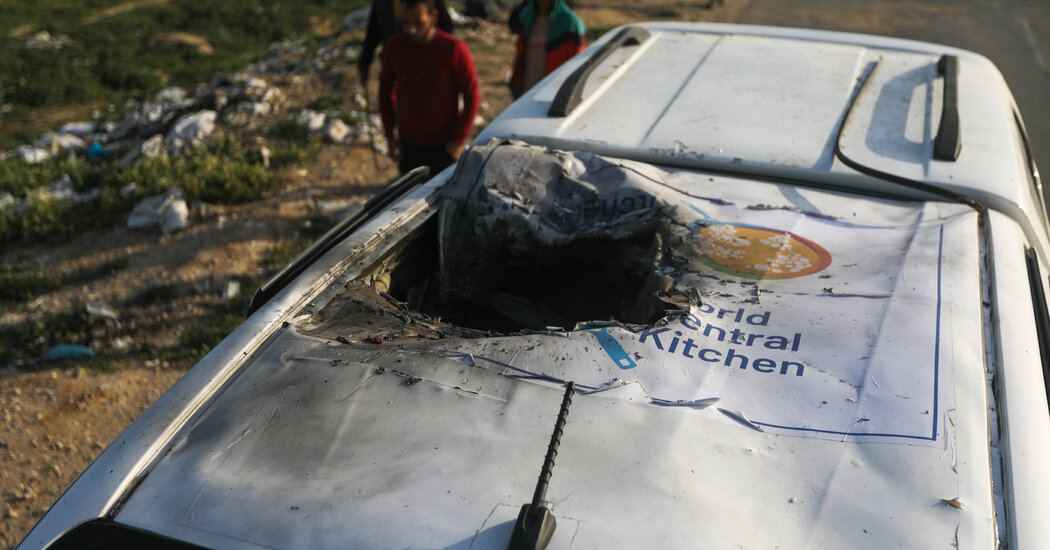Table of Contents
Aid workers killed in Gaza
Israeli strikes on an aid convoy run by the charity group World Central Kitchen killed seven of its workers in the Gaza Strip. Prime Minister Benjamin Netanyahu apologized, and said Israel “deeply regrets” the strike. He called it “a tragic case of our forces unintentionally hitting innocent people.”
The workers were traveling in clearly marked vehicles, and World Central Kitchen said it had coordinated its movements with Israel’s military. Israel is investigating the circumstances surrounding the strikes.
The war has been exceptionally dangerous for aid workers — at least 196 have been killed since the war began, according to the U.N. World Central Kitchen, which has become an important player in delivering supplies to an enclave on the edge of famine, has suspended its operations in Gaza. So has another aid agency, American Near East Refugee Aid.
What we know: The aid workers killed included a Palestinian, an Australian, a Pole, three Britons and a dual U.S.-Canadian citizen. The convoy of three vehicles had just left a food warehouse. Videos and photos verified by The Times suggest it was hit multiple times.
In a rare call, Biden spoke with Xi
President Biden had a rare telephone conversation with Xi Jinping, China’s leader, yesterday that was aimed at addressing a variety of issues, both combative and cooperative, and steady a relationship that hit a multi-decade low last year.
The topics raised by Biden included fighting narcotics production, the Middle East conflict, North Korea’s nuclear program and China’s support of Russia during the Ukraine war, according to a summary provided of the call. He also raised concerns over Beijing’s aggression involving Taiwan and the South China Sea.
China said that Xi had called for “concrete actions” to demonstrate a U.S. commitment not to support Taiwan’s independence. Xi also criticized the “endless stream of measures” taken by the U.S. to try to suppress China’s economy, science and technology, China said.
Context: Biden and Xi have both sought to prevent any public eruptions. Biden wants to focus on his re-election campaign, while Xi faces a troubled economy and corruption in the top ranks of his military.
What’s next: Janet Yellen, the U.S. treasury secretary, is heading to China this week for economic talks. Antony Blinken, the U.S. secretary of state, will follow soon afterward.
The drones struck in the Tatarstan region, about 700 miles (over 1,100 kilometers) from Ukrainian-held territory. Ukraine’s campaign of strikes against Russian refineries since last October has shrunk Russia’s refining capacity, and has recently forced Moscow to enact a six-month ban on gasoline exports.
Weapons: Ukraine is increasing its arms production. It may not be moving fast enough.
MORE TOP NEWS
Chinese consumers spend big for swiftlet nests. (They’re a key ingredient in bird’s nest soup, a delicacy that many believe has health benefits.) Some in Indonesia are cashing in on the interest, competing to build luxurious accommodations to attract their picky, winged guests.
CONVERSATION STARTERS
Is A.I. increasing productivity?
Many big companies have adopted generative A.I. to deal with annoying tasks, beef up their marketing pushes or match prices to demand. And enthusiastic tech investors have added trillions in market value to a few firms.
But the research on A.I. and efficiency is still shaky. Many economists and officials seem dubious that A.I. has spread enough to show up in productivity data already. Others, like the M.I.T. labor economist David Autor, say it could potentially increase the size of the middle class by allowing workers to perform some tasks that currently require highly skilled experts.
RECOMMENDATIONS
Cook: Add turmeric to this creamy pasta.
Read: Neel Mukherjee’s “Choice” is a novel full of characters deciding how much truth to tell.


